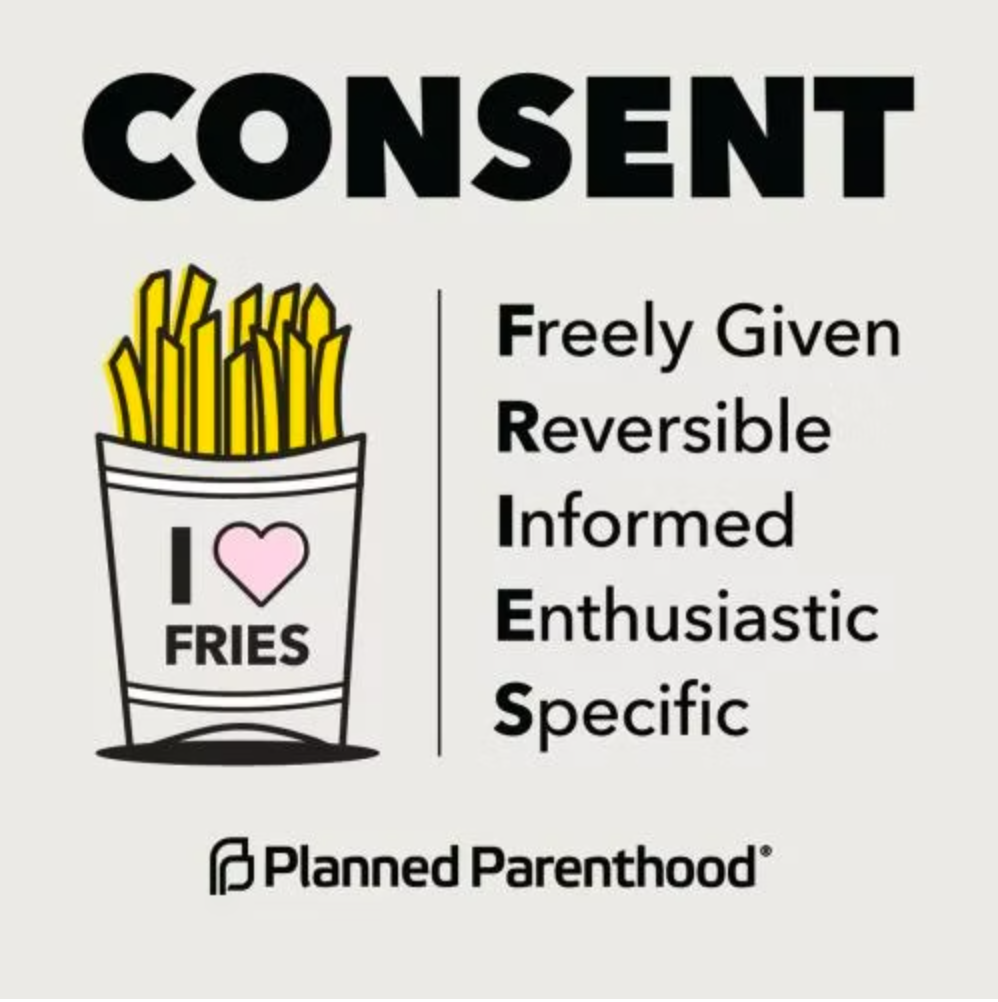Defining Consent: From FRIES to CRISP!
In the past, many intimacy professionals, including IDC teachers, have used the Planned Parenthood acronym when teaching consent: FRIES. It stands for Freely Given, Reversible, Informed, Enthusiastic, and Specific. You’ve probably seen this image from their website at some point.
As a framework, FRIES has served the intimacy community, but it also has some shortcomings. FRIES was created by Planned Parenthood as a definition for actual sexual encounters, not for crafted and simulated performances of romance and intimacy. No matter how much art tries to imitate life, there are still some major differences, which affect the pieces of the consent puzzle.
Freely given doesn’t translate well to the entertainment industry because individuals involved in performing intimacy are doing a job; they are employees, and that comes with all of the inherent power dynamics within hierarchical capitalistic organizations. In almost no other professional setting would you see a boss, with hiring and firing power, asking two employees to kiss, or get naked. But often to get a story told writers, directors, and producers may be asking actors to do exactly that. Saying no, may result in not being considered for a job (role) or ultimately lead to someone needing to leave a project. This dynamic is compounded by other larger systems of oppression in our society which can increase the personal toll of saying no. There is money and professional reputations on the line, no matter how diplomatic the communication may be.
Enthusiastic doesn’t translate well either. Performing intimacy is a courageous and vulnerable act, and while some people may experience enthusiasm at the prospect, most folks I talk to experience nervousness and uncertainty. There are a lot of questions and specifics that need to be worked through to approach something looking like enthusiasm, and sometimes even then actors may confidently consent with something closer to grim determination than enthusiasm. Intimacy in real life should be enthusiastic, joyful, and personally fulfilling. Intimacy in performance doesn’t have to be in order for the actor to be fully on board with doing the job.
We’ve been having a lot of internal discussions about the shortcomings of FRIES over the last year and a half, and we are excited to have a new acrostic definition for consent as it exists specifically in entertainment to share with you. CRISP!
We’ve kept Reversible, Informed, and Specific because those three elements are important for real and performed intimacy, but we’ve gotten rid of Freely Given and Enthusiastic and replaced them with Considered and Participatory.
We love Considered because while we can’t fully erase the power dynamics, systemic racism, and other effects of oppression that make freely given consent difficult, we can consider all of the factors and information when ultimately making a decision about whether to give or withhold consent. This requires time and space for actors to get the information they need and consider all of the potential repercussions associated with their decision. In practice, this looks like making structural changes that give actors adequate time to consider requests and role requirements, thorough communication on the specifics of the moment, and uncoupling consent decisions from employment status by finding creative storytelling solutions that are within the actor’s boundaries.
Participatory means that people need to be involved in the decision making process around what happens with and to their body! It means that decisions aren’t just handed down to actors about what will happen in a scene, but that they are invited into the conversation as full and equal participants in the creative decision making process. Scenes with intimacy may not be comfortable to do, but full participation in crafting the moment can increase an actor’s confidence and sense of agency inside a challenging role. Additionally, when actors are invited to participate in the decision making process, they are more easily able to advocate for their needs without fear of disrupting communication flow or going against a prescribed vision.
We’re very excited to be utilizing this definition of consent in entertainment for our team and our pedagogy. This blog post just serves as a little taste. We’re still in the process of refining and integrating CRISP into all of our curriculum and resources, so keep on the lookout for other CRISP-related content in the Consent Studio this month! Lauren Kiele DeLeon, Claire Warden, and Colleen Hughes recently held a "roundtable" discussion to share their thoughts on CRISP!
Enjoy some pumpkin spice, sweaters, and the sound of CRISP autumn leaves. (See what I did there?)
As always we want to hear from you!
Does CRISP resonate with your experience of consent in entertainment? Why or why not?
Do you have a personal experience where the Freely Given or Enthusiastic pieces of FRIES became challenging to actualize?
Let us know what you think! Leave a comment in the Consent Studio!



